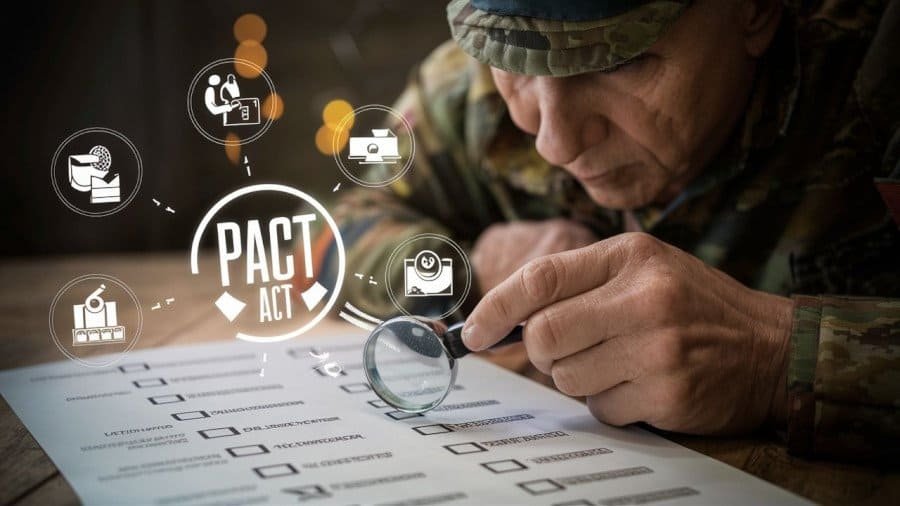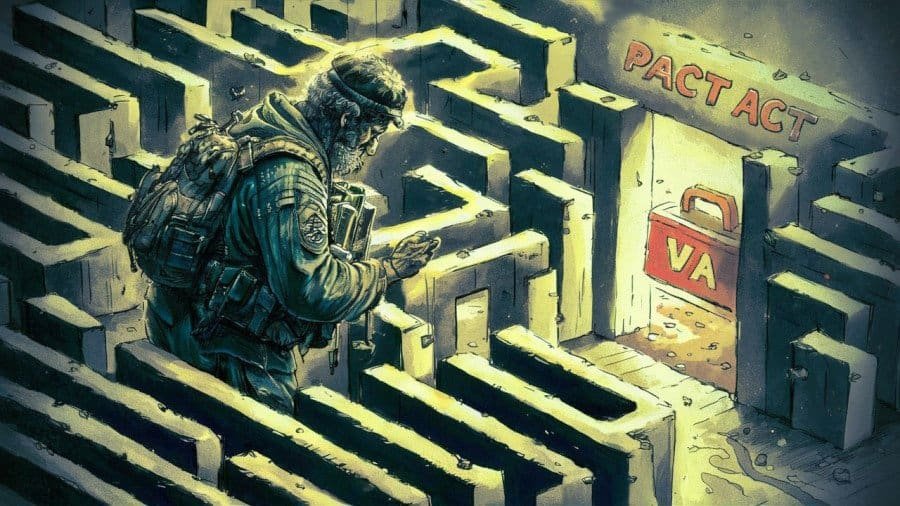Have you ever wondered if the PACT Act could enhance your VA benefits and care?
In essence, the PACT Act significantly expands health care and benefits for Veterans exposed to toxic substances. But what does that mean for you?
Well, let’s unravel the specifics, explore how it directly impacts your entitlements, and discover how you can make the most out of this legislation, especially if you’re looking to apply for VA health care.
This is your chance to understand better how the country is stepping up to better serve Veterans like you. Stick around, you don’t want to miss this.
Key Takeaways
• The PACT Act significantly expands VA health care and benefits, especially for Veterans exposed to toxic substances.
• This Act simplifies service connection, adds new presumptive conditions, and mandates toxic exposure screenings for enrolled Veterans.
• Eligibility and benefits vary depending on service period, location, and toxic exposure, including coverage for Camp Lejeune Contaminated Water victims.
• The PACT Act emphasizes early detection and treatment through efficient and accessible screenings, thus enhancing Veterans’ health care provisions and disability compensation.
Understanding the PACT Act

Let’s delve into understanding the PACT Act, the largest healthcare and benefit expansion in VA history, designed to offer expanded healthcare eligibility and introduce new presumptive conditions for Veterans exposed to burn pits and other toxins.
This monumental legislation increases VA healthcare eligibility for those Veterans who’ve suffered from toxic exposures during their service, a critical step in acknowledging and addressing the health issues they face.
The Act mandates the VA to execute toxic exposure screening for all enrolled Veterans. This screening process is pivotal in showing potential exposures to toxins like burn pits and Agent Orange and can ultimately streamline your healthcare process.
Furthermore, the PACT Act simplifies the service connection for presumptive conditions related to toxic exposure.
You no longer must prove that these conditions are linked to your military service, reducing the burden of proof on you and ensuring you get the benefits you’re entitled to more swiftly, thanks to the Veterans Benefits Administration.
Eligibility Criteria Under the PACT Act

Having understood the significance of the PACT Act, you might be wondering what the eligibility criteria are for receiving help from this legislation. For Gulf War-era veterans, it’s necessary to meet specific service criteria. Your exposure to certain toxins and your service location form the basis for your eligibility.
The rules for those who served during the Vietnam Era are slightly different. If you’re a Vietnam-era veteran, your eligibility is based on service in specified locations and documented exposure to toxins.
The PACT Act also extends benefits to Nuclear and Radiation-Exposed Veterans by expanding eligibility for presumptive service connection, acknowledging the health conditions covered by the Department of Veterans Affairs. So, if you’ve been exposed to radiation during your service, the PACT Act might offer you more benefits.
Presumptive Conditions and Toxic Exposure

Under the PACT Act, you’ll find an expansion of presumptive conditions, which are health issues automatically linked to military service and toxic exposures, easing the process for accessing VA benefits. This means you won’t have to prove a service connection to these conditions, they’re established by law or regulation.
1. VA disability ratings: They automatically link your military service to presumptive conditions, ensuring you get the proper benefits.
2. Presumptive conditions: You don’t need to provide proof of service connection. If you meet the service requirements, you’re covered.
3. Toxic exposures: If exposed during service, you’re eligible for toxic exposure screenings provided by the VA.
4. PACT Act: This legislation adds over 20 new presumptive conditions related to toxic exposure from your military service.
Benefits for Gulf War and Post-9/11 Veterans

Building on what we know about the PACT Act and presumptive conditions, it’s worth noting that Gulf War and Post-9/11 Veterans in particular stand to benefit significantly from this legislation. The Act is a lifeline for you if you’re a veteran from these eras. It adds over 20 new presumptive conditions related to toxic exposures during service. This is a significant change in easing the process for accessing VA benefits.
As a Gulf War or Post-9/11 Veteran, you’re eligible based on the presumption of exposure to toxins. This means you can now access disability compensation and health care services for conditions related to toxic exposures without needing to apply for benefits first. The Act acknowledges your sacrifices and ensures you get the care you deserve.
The PACT Act introduces new presumptive conditions specifically tailored to address your health concerns. It’s a step forward in recognizing your unique challenges and providing appropriate healthcare solutions. So, it’s crucial to understand the implications of the PACT Act on your VA benefits to make informed decisions about your care and compensation.
Benefits for Vietnam Era Veterans

Navigating the expanded benefits under the PACT Act, you, as a Vietnam-era veteran, could qualify for VA benefits if you served in specific locations during the Vietnam War. This Act provides enhanced support for veterans who’ve suffered from toxic exposures like Agent Orange during their service, a step appreciated by the Veterans Health Administration.
As a Vietnam Era Veteran, the PACT Act specifically considers:
1. Your service location: Your VA benefits are decided by whether you served in Vietnam, Thailand, Laos, or Cambodia.
2. Disability compensation: The Act broadens your eligibility for disability compensation by including a range of specified diseases.
3. Exposure to toxins: Exposure to herbicides such as Agent Orange during your service period entitles you to added benefits, overseen by the Department of Veterans Affairs.
4. Presumptive conditions: A full list of presumptive conditions related to toxic exposures is provided, increasing your entitlement to VA health care and compensation.
Process of Claiming Benefits

Now that you’re aware of the benefits you could qualify for as a Vietnam-era veteran, let’s move on to understand how to claim these benefits under the PACT Act.
The filing process begins by applying for disability compensation using VA Form 21-526EZ. This form is crucial to start your claim and ensure you meet all eligibility requirements.
Disability compensation is a significant part of the benefits package under the PACT Act. However, it’s not automatic; you must meet specific eligibility requirements. Therefore, it’s vital to gather all necessary documentation to support your claim, demonstrating that your disability is service-related, as required by the Veterans Benefits Administration.
The documentation you provide should clearly show the relationship between your service and your disability. It’s often where most claims face challenges, so it’s crucial to be meticulous. Don’t underestimate the importance of accurate and complete records.
Importance of Toxic Exposure Screenings

Understanding the importance of toxic exposure screenings is key to fully using the benefits of the PACT Act. As a veteran enrolled in VA health care, these screenings are part of your benefits and can significantly affect your medical care.
1. Regular Screenings: You’re entitled to a toxic exposure screening every five years. This preventative measure is essential in the early detection and treatment of potential health issues related to toxic exposure.
2. Broad Coverage: The screenings aren’t limited to one type of hazard. They cover exposures from burn pits, Agent Orange, radiation, and contaminated water at Camp Lejeune.
3. Efficiency: The screenings are quick and straightforward, typically lasting between 5-10 minutes. They’re designed to identify any potential exposures to toxins that may have occurred during your service.
4. Accessibility: You can schedule your screenings online or by directly contacting a VA facility.
Conclusion
The PACT Act is here to take care of you, recognizing the sacrifices you’ve made. It extends your VA benefits, emphasizing toxic exposures like burn pits and Agent Orange.
Whether you’re a Gulf War, Post-9/11, or Vietnam Era veteran, this Act has got you covered. Remember, claiming benefits and regular toxic exposure screenings are crucial.
You’ve served your country. Now, let it serve you.





